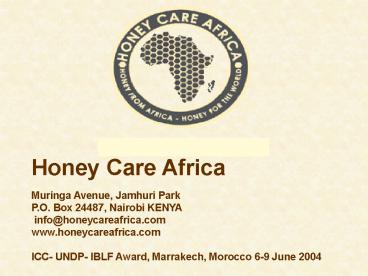Honey Care Africa
1 / 12
Title: Honey Care Africa
1
Honey Care Africa Muringa Avenue, Jamhuri
ParkP.O. Box 24487, Nairobi KENYA
info_at_honeycareafrica.com www.honeycareafrica.com
ICC- UNDP- IBLF Award, Marrakech, Morocco 6-9
June 2004
2
Brief History of Beekeeping in Kenya
- Very old activity in the Region
- Log Hives most common and dominated by men
- Crude harvesting techniques, low yields and poor
quality honey - Previous Government Donor interventions
unsuccessful - Result Kenya a net importer of honey
3
Honey Care Africa
- Established in March 2000 as a private sector
organisation, but with an explicit sustainability
agenda. - Best described as a Social Enterprise
- Using better beekeeping technology to improve
rural incomes, empower women and youth, and
promote biodiversity conservation. - Fair Trade Organization and committed to
Triple-Bottom Line Value Generation.
4
Methodology Honey Cares Tripartite Model
- Emerged from attempt to redefine role of private
sector as a more engaged and pro-active driver
for development in the South. - Innovative, synergistic partnership between
private sector, development sector and rural
communities. - Utilising key strengths of the three partners for
mutual enhanced benefit. - Specific roles defined for each party, governed
by MOU.
5
Outline of Honey Care Africas Tripartite Model
Honey Care
Symbiosis
Rural Communities
Donor / MFI
6
Honey Care Africas Products and Services
- Manufacture of Langstroth Hives to international
standards - Outsourcing supply of other beekeeping equipment
from community groups and informal Jua Kali
sector - Demonstrations at village-level across rural
Kenya - Linking potential beekeepers with funding sources
(Donor / MFI) - 3-day hands-on practical beekeeping training in
local dialects
7
Honey Care Africas Products and Services
- Extension and Technical support provided at no
cost to beekeepers - Honey Extraction and Collection services at
village level - Guaranteed market for honey at Fair Trade prices
- Cash-on-spot payment direct to beekeeper at
farm-gate - Loan deduction made from honey sale and remitted
to donor / MFI - Honey processed, packaged and sold for a profit
8
Social Impact
- Over 6,000 potential beekeepers sensitised
- Over 1,050 New Beekeepers Trained
- 37 of Beekeepers are now Women
- 13 of Beekeepers are Youth
9
Economic Impact
- 17,500 Langstroth Hives established across Kenya.
- Over 2,500 households now earning a supplementary
income of US 200-250 per annum. - Hive Micro-Leasing Scheme established with Africa
Now and K-Rep Development Agency (MFI).
10
Environmental Impact
- Positive Environmental and Biodiversity value
creation through pollination. - 0 waste generated everything is recycled
- Alternative and sustainable income generation
- Beyond Environmental Impact mitigation
11
Honey Care Africas Partners
- 17 International Development Organizations, Donor
Agencies, NGOs and Institutions - They DO NOT fund our overheads or subsidize our
operating expenses - Network of over 250 CBOs, Womens Groups, Farmer
Groups, Youth Groups and Self-Help Associations
12
Replication and Next Steps
- Successful Replication of model undertaken in
Macedonia in 2003/4 through the Southeast Europe
Enterprise Development (SEED) Program. - HACCP and ISO 9002 / 14001 certification underway
shortly. Supported by grant from IFC. - Export markets for honey are currently being
sought in the EU, Middle East and US. - Discussion with World Bank-IFCs GBO Initiative
just completed. - Establishment of Honey Care Africa in Tanzania
currently underway.































